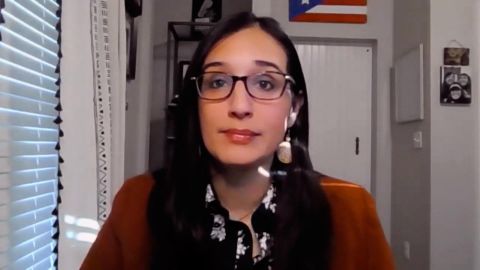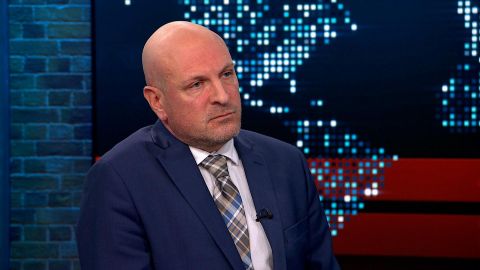Read Transcript EXPAND
CHRISTIANE AMANPOUR, INTERNATIONAL HOST: Our first guest tonight, Josh Paul, resigned from the State Department soon after October 7th in protest of what he said were unscrutinized U.S. arms transfers to Israel. In his resignation letter, he said the Israeli response and American support “will only lead to more and deeper suffering for both the Israeli and Palestinian people and is not in the long-term American interest.” And Josh Paul is joining me now. Welcome to the program.
JOSH PAUL, RESIGNED U.S. DEPARTMENT OVER ARMS TRANSFERS TO ISRAEL: Thank you very much indeed for having me.
AMANPOUR: So, I was struck by what the U.S. defense secretary said. I mean, this is a very bold military assessment that this amount of civilian killing is going to lead not only to this tragedy that the world is witnessing, but a strategic, he used the word, defeat.
PAUL: Yes.
AMANPOUR: And, so tell me, how do you assess what he said?
PAUL: I think he’s right. And I think what you see is a tension between those of us who have worked in political and military fields on the ground in the Middle East and in the defense establishment in the uniformed services who understand that this is not going to work. This is not going to lead to the result that Israel wants. It is just going to prolong the suffering of both the Israeli and the Palestinian people for another generation as opposed to, I think, a very political, ideological perspective that is coming from the political level in the U.S. and in Israel and in the U.K. that thinks that there is a way to make this work. There is not. And the suffering we are seeing on the ground really reflects that. I can’t recall a time, in my experience, where I’ve seen such a disconnect between our values and our actions or between the perspectives of our political leadership and the realities on the ground.
AMANPOUR: Can I ask you where and how you draw that line and make that difference? This is not the first time Israel has gone to war against Hamas in Gaza, and it’s not the first time there has been backlash around the world. What makes you say that this is so different to have caused you to have resigned?
PAUL: So, a number of factors. The first of which is just the scope and the scale. You know, here we are two months into this conflict, and we have seen three times more children die, 6,000 in Gaza, than in two years of Russia’s war against Ukraine. We have seen over 50 journalists killed, over 100 U.N. aid workers, over 200 medical professionals. You know, do you know what it takes to be a doctor in Gaza? So, the scale —
AMANPOUR: We’ve interviewed a lot of them and it’s a terrible situation for them.
PAUL: The scale of the loss has been astounding. And, of course, my role in the State Department It involves approving many of these major arms transfers that are going to Israel right now that are enabling this killing.
AMANPOUR: But this is American policy. It’s not like these are rogue transfers. This is American policy, bipartisan, decades long. Israel is America’s strongest ally in the Middle East, and America provides the most aid in the world to Israel and obviously to Egypt as well, but in general to Israel. Again, what is so unscrutinized about this? What was so different that made you resign publicly?
PAUL: Well, in all the arms transfers I’ve been a part of discussing before, including to Israel, there has always been space for discussion and debate. You can raise concerns about how are these arms going to be used. Do we have confidence that laws of war, laws of proportionality are going to be respected? Do we have concerns about some of the units that these arms might be going to and their track records? What was different here was that there was no discussion. There was no space for that discussion. There was simply an approach of essentially the barn doors are open and that remains the case. You know, “The Wall Street Journal” reported just in the last couple of days that America has transferred over 4,000 dumb bombs to Israel, several thousand guidance kits, and 45,000 artillery shells. So, the barn doors remain open. And while I’m certainly encouraged to hear what Vice President Harris said, what Secretary Austin has said, for as long as those barn doors remain open, I don’t know why Israel would take those warnings seriously.
PAUL: Can I just read the State Department response to your resignation, basically saying that it expects and appreciates employees have different beliefs. And of course, one thing that is actually kind of interesting for all of us is to know that there is a dissent, there’s an official dissent channel in the State Department that allows people to air their concerns. And that is, you know, history from the Vietnam War. This is what the State Department says about you. With respect to this specific criticism that’s been aired, we have made very clear that we strongly support Israel’s right to defend itself. We’re going to continue providing the security assistance that they need to defend themselves. But the president and the secretary of state has spoken to this very clearly, that we expect Israel to abide by all international law as they defend themselves. Israel says it’s doing that to the best of its ability.
PAUL: So, I think we have a responsibility as the larger, more powerful partner in this relationship, to give advice, to give guidance, to step in when things are not going right. And when we say that we have a responsibility to — or a commitment to defend Israel and to support Israel’s security, I have — I think we have to look at the situation on the ground and say, is that what is actually happening? Is Israel more secure as a result of our assistance or has our military assistance enabled Israel to move ahead with the expansion of settlements in the West Bank to continue the siege of Gaza and to take steps that ultimately undermine its own security rather than leading to a comprehensive peace?
About This Episode EXPAND
Josh Paul resigned from the U.S. State Department over arms transfer to Israel, he explains why. Rana Salman, a Palestinian human rights activist, and May Pundak, an Israeli human rights, lawyer explain their vision for the future of the region. Arelis Hernández of the Washington Post on Puerto Rico’s health care crisis. Aria Mia Loberti on her new Netflix show “All the Light We Cannot See.”
LEARN MORE

